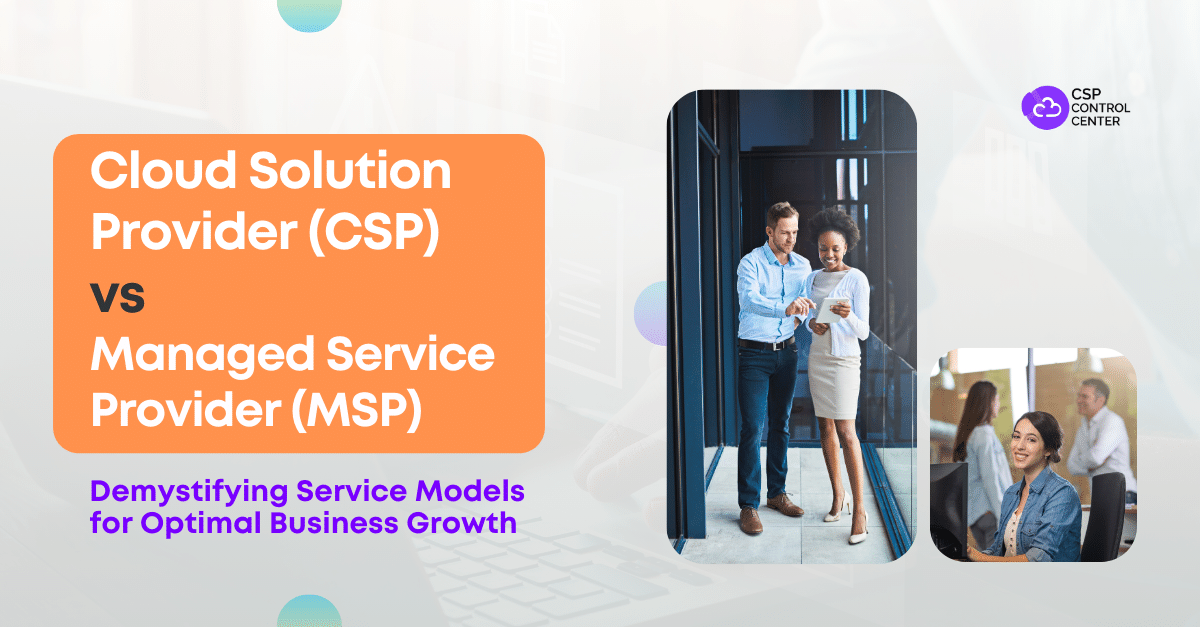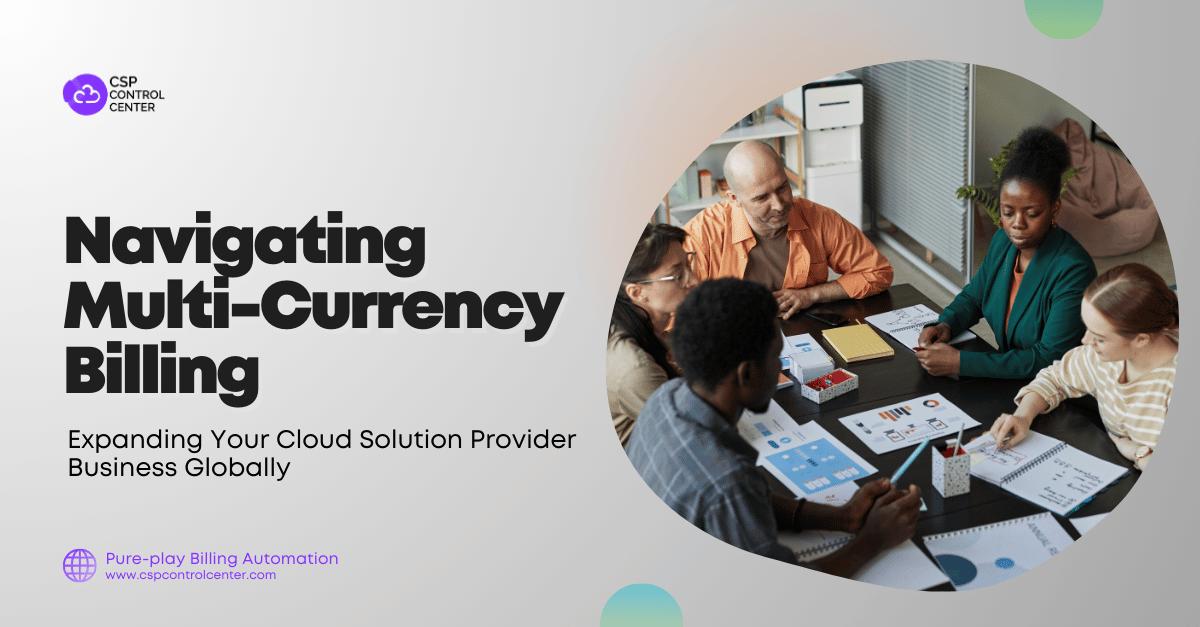Cloud computing is rapidly evolving and reshaping how businesses manage and operate their IT resources. Increased businesses are leveraging the cloud because of its scalability, cost-effectiveness, and enhanced security features. According to research by MarketsandMarkets “The global cloud computing market is expected to grow from USD 626.4 billion in 2023 to USD 1,266.4 billion by 2028 at a CAGR of 15.1%”. As a Microsoft partner, you can help your customers navigate the complex and ever-evolving cloud landscape. The two primary service models offered by Microsoft that can help deliver value to customers are the Cloud Solution Provider (CSP) program and the Managed Service Provider (MSP) program. The Cloud Solution Provider (CSP) program allows you to sell and provision Microsoft Cloud solutions such as Azure, Office 365, and Dynamics 365, along with services and products developed by you or third parties. On the other hand, through the Managed Service Provider (MSP) program, you can provide proactive and ongoing IT management and support services to your customers.
The CSP and MSP service models each offer unique opportunities and advantages for partners to grow their business, boost revenue streams, and strengthen their relationship with both customers and Microsoft.
Cloud Solution Provider (CSP) model
Under this service model, you get the opportunity to sell a comprehensive suite of Microsoft cloud services, including Office 365, Azure, and Dynamics 365, to your customers. Apart from selling and provisioning Microsoft subscriptions, you can customize solutions per the customer’s needs and sell them value-added services. The Microsoft CSP program has two models: the indirect model and the direct-bill model. As a direct-bill partner, you will purchase Microsoft products and subscriptions directly from Microsoft and sell them to your customers. Whereas, as an indirect reseller, you purchase Microsoft products and services from an indirect provider.
Eligibility requirements for becoming a Microsoft CSP
Whether you want to enroll as a direct-bill partner or an indirect reseller, you need to have an active membership in the Microsoft AI Cloud Partner Program and PartnerID for the location you want to sell in. Apart from this to become a direct-bill partner you also need to have the necessary infrastructure to support billing, provisioning, customer support, and security, meet the minimum requirement of USD300K in annual revenue in the Microsoft CSP program in the last twelve months, and fulfill your support obligation by purchasing a suitable Microsoft support plan, be it Advanced Support for Partners (ASfP) or Premier Support for Partners (PSfP), based on your specific needs.
Key Responsibilities of Microsoft CSPs
As a Microsoft CSP, you should ensure that Microsoft products and services are successfully deployed, and customer needs are met. Some of the key responsibilities include:
Onboarding customers
You have to help your customers understand the benefits and features of Microsoft Cloud products and services. You need to help them choose the right solutions based on their business needs.
Managing licenses and subscriptions
Once your customers have decided what products and services they require, you need to manage and provision Microsoft Cloud subscriptions for your customers. You need to ensure timely subscription renewals to avoid disruption in services.
Deploying and configuring
As a Microsoft CSP, you need to assist customers with deploying and configuring Microsoft cloud services. You can also customize solutions to meet customers’ specific requirements.
Offering support
Another responsibility of being a Microsoft CSP is to provide ongoing support and troubleshooting to customers. This involves offering technical and billing-related support. You can either resell support from a third party or provide the support yourself.
Handling billing and invoicing
You must manage the entire billing cycle for your customers. From sending out timely invoices to collecting payments and resolving billing disputes, it is your responsibility to maintain accuracy and transparency.
Benefits of the CSP Model
Becoming a Microsoft CSP offers partners a range of benefits, including increased revenue, flexibility to scale business, and the opportunity to leverage Microsoft’s extensive resources to drive business growth. Here are some of the benefits of the CSP model-
Recurring revenue
Under the CSP model, you can generate recurring revenue through monthly or annual subscriptions and renewals. This predictable revenue can improve financial stability and facilitate better planning for future expansion.
Scalability
As your customer base grows and customer needs change, you can easily scale your business and adapt to the changing needs without any significant investment in infrastructure.
Access to Microsoft resources
You can leverage Microsoft’s extensive resources including training programs, marketing materials, and sales support. These resources can help attract new customers, improve your expertise, and enhance customer experience.
Faster time to market
The CSP model allows you to roll out your cloud service solutions swiftly. You do not need time to develop and manage your infrastructure. Instead, you can focus on customer acquisition, marketing, and customer experience.
Challenges of the CSP Model
The CSP model has several benefits but at the same them there are some challenges and limitations associated with it. Let us have a look at some of the challenges of the CSP model-
Customer acquisition & retention
Acquiring new customers and retaining the existing ones can be challenging due to competition from other CSPs. Apart from fierce competition, customers also demand better experience and service which requires more effort to retain them.
Pressure on margins
Only selling Microsoft products can hurt your profitability due to lower margins. As the competition increases, you have to offer better prices and discounts to close deals. This can reduce your profit margins and impact on your bottom line. Unless you differentiate yourself and offer additional value-added services you cannot maximize profit.
Technical support responsibility
Providing timely and satisfactory customer support can be challenging, especially if you sell in multiple locations. You need to invest time and resources in support technologies and infrastructure and employee training.
Billing and invoicing
Ensuring timely and error-free invoicing for multiple customers, especially when dealing with varied subscription terms and usage levels can be difficult. As the billing complexity increases so does the probability of billing errors leading to revenue leakages and reduced customer satisfaction. Read our blog to learn about billing and invoicing mistakes to avoid.
Managed Service Provider (MSP)
As a Microsoft Managed Services Provider (MSP), you focus on IT services beyond just selling and provisioning Microsoft Cloud solutions. These services can range from IT infrastructure management and support to cybersecurity, cloud computing, network operations, and beyond. The key characteristic of MSPs is their proactive approach to managing and maintaining their clients’ IT systems, often through remote monitoring and management tools. The Microsoft Azure Expert Managed Services Provider (MSP) program is designed to recognize and support the most capable Azure MSPs and help them deliver value and drive revenue.
Eligibility requirement of becoming a Microsoft Azure Expert MSP
There are stringent criteria that you must meet to become an Azure Expert MSP. You need to meet eight basic requirements before you can start the application process. The prerequisites are:
- Partner program tier– you must have an active Solutions Partner for Data & AI, Solutions Partner for Digital & App Innovation, and Solutions Partner for Infrastructure.
- Cloud Solution Provider (CSP)– you need to have an active CSP contract.
- Azure consumption– You need to achieve a high monthly revenue generated through Azure consumption.
- MSP offer– Your MSP service must be available and listed on AppSource or the Azure Marketplace.
- Azure MSP offer– You need to feature and promote your Azure MSP offer on your website.
- Certified staff- you need to ensure that a minimum number of your employees hold the necessary certifications.
- Customer references– you are required to present four customer references and submit a public case study.
- Support contract– you must have either Advanced Support for Partners or Premier Support for Partners specifically for Azure.
Key Responsibilities of Microsoft MSPs
As an MSP, you focus on delivering end-to-end managed services to meet customers’ unique business needs and ensure optimal performance and reliability. Some of the key responsibilities of this role include-
Infrastructure management
You are responsible for overseeing and optimizing customers’ IT infrastructure, including servers, networks, and cloud environments.
Strategic guidance
Your role involves providing customers with expert guidance such that the technology solutions align with their business goals.
Ongoing support
You need to provide continuous technical, billing, account related etc support to your customers. Addressing customer issues promptly and ensuring smooth operations is required to enhance customer satisfaction and loyalty.
Benefits of the MSP Model
The Microsoft MSP program can equip you with the necessary tools and knowledge to become trusted advisors to your customers. Let us have a look at the advantages of becoming a Microsoft MSP-
Competitive differentiation
You get an Azure Expert MSP badge which recognizes your expertise in delivering managed services on Azure. This exclusive badge helps you stand out from the competition and attract and retain more customers.
Enhanced customer value
By offering end-to-end solutions that go beyond just selling a product, you can solve customers’ business problems. This improves customer satisfaction, enhances customer experience, and fosters long-term partnerships.
Access to advanced resources
As an MSP you gain access to exclusive resources and tools, such as in-depth training, co-marketing opportunities, and technical support. These resources can help you to implement innovative solutions and deliver exceptional service to customers.
Higher profit margins
Offering your customers a broader range of services including security management, cloud management, ongoing support, etc. helps you command higher margins compared to CSPs.
Also, with a high level of technical expertise you can charge a premium for your services.
Challenges of the MSP Model
While becoming a MSP offers significant advantages, several challenges need to be overcome for achieving sustainable growth and delivering exceptional value to customers. Some of the key challenges include:
Client onboarding
The client onboarding process can be more time-consuming and complex due to the substantial number of services involved. As you take on a more comprehensive role, you need to understand the unique needs of each customer, assess the existing IT infrastructure, and customize solutions that are industry or customer specific.
Billing complexity
Managing the billing of a broad range of services, subscription terms and pricing models can be challenging. Manually handling the billing of a large customer base further adds to the complexity and increases the chances of billing errors and delays.
High entry barrier
Requirements such as a high threshold of minimum Azure consumed revenue per month, deep Azure expertise, having a minimum number of employees with the requisite certifications, and offering a wide range of services can significantly push up the initial investment.
Drive business growth with C3
With C3, you leverage the power of Microsoft CSP billing automation to drive business growth and enhance customer experience. C3 can help streamline your billing processes, manage subscriptions with ease, equip customers with self-service, improve payment reliability, provide valuable data and customer insights and much more. Embracing Microsoft CSP billing automation can help you deliver high-quality customer service leading to business sustainability and growth.
Book a demo to learn more about the capabilities of CSP Control Center.

 CSP Control Center
CSP Control Center
 CloudEvents
CloudEvents


